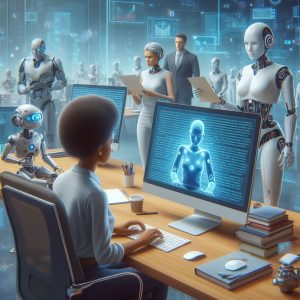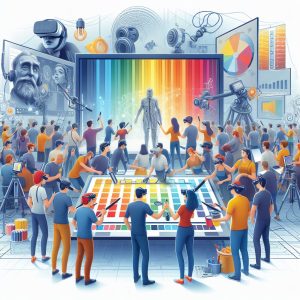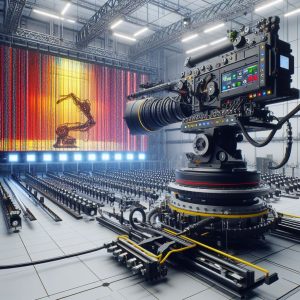The role of AI in the film industry has been growing rapidly in recent years. From AI-powered software that can analyze scripts and predict their success, to AI-generated movie trailers that can be tailored to specific audiences, AI is having a major impact on how films are made and marketed.
One area where AI is making a big difference is in the way that films are reviewed and discussed. AI-powered tools can now analyze a film’s dialogue, cinematography, and other elements to generate a detailed review. These reviews can be used by audiences to decide whether or not to see a film, and they can also be used by filmmakers to get feedback on their work.
How AI is being used to review and discuss films
There are a number of ways that AI is being used to review and discuss films. Some of the most common methods include:
- AI-powered software can analyze a film’s dialogue, cinematography, and other elements to generate a detailed review. These reviews can be used by audiences to decide whether or not to see a film, and they can also be used by filmmakers to get feedback on their work.
- AI-generated movie trailers can be tailored to specific audiences. This can help to increase the number of people who see a film, and it can also help to generate buzz for a film before it is released.
- AI-powered chatbots can be used to answer questions about films and to provide recommendations. This can help audiences to find films that they might enjoy, and it can also help filmmakers to connect with their fans.
The benefits of using AI to review and discuss films
There are a number of benefits to using AI to review and discuss films. Some of the most notable benefits include:
- AI-powered reviews can be more objective than human reviews. This is because AI is not influenced by personal biases or emotions.
- AI-powered reviews can be more detailed and comprehensive than human reviews. This is because AI can analyze a film’s dialogue, cinematography, and other elements in a way that humans cannot.
- AI-powered reviews can be generated more quickly than human reviews. This means that audiences can get information about a film more quickly, and filmmakers can get feedback on their work more quickly.
The challenges of using AI to review and discuss films
There are also a number of challenges associated with using AI to review and discuss films. Some of the most notable challenges include:
- AI is not always accurate. This is because AI is still a developing technology, and it can sometimes make mistakes.
- AI can be biased. This is because AI is trained on data that is created by humans, and humans are often biased.
- AI can be used to generate fake reviews. This can mislead audiences and filmmakers, and it can also damage the reputation of AI-powered review systems.
The future of AI in film criticism and discussion
AI is still a developing technology, but it is already having a major impact on the film industry. As AI continues to develop, it is likely that we will see even more ways in which AI is used to review and discuss films. Some of the potential future applications of AI in film criticism and discussion include:
- AI-powered software that can generate personalized movie recommendations for each user. This would help audiences to find films that they are more likely to enjoy.
- AI-powered chatbots that can answer questions about films and provide recommendations in real time. This would help audiences to find information about films more quickly and easily.
- AI-powered software that can analyze a film’s box office performance and social media buzz to predict its success. This would help filmmakers to make more informed decisions about which films to make.
AI is changing the way that films are reviewed and discussed. As AI continues to develop, we are likely to see even more ways in which AI is used to analyze, interpret, and discuss films.
Exploring the Dangers and Opportunities of Film Criticism/Reviewer Roles in the Cinema Industry in the Age of AI
Introduction:
The film industry is undergoing a profound transformation driven by technological advancements. As artificial intelligence (AI) continues to make waves across various sectors, its impact on the role of film critics and reviewers has become a topic of increasing relevance. This blog delves into the dangers and possibilities of AI replacing film critics/reviewers, examines how AI can be leveraged to enhance their work, and provides guidance on adapting to the changing landscape.
Dangers of AI Replacing Film Critics/Reviewers:
- Loss of Human Perspective: AI lacks the emotional and subjective elements that are essential for critical analysis. Its automated algorithms may struggle to capture the nuances and depth of a film’s message, leading to potentially shallow or biased reviews.
- Homogenization of Reviews: AI-generated reviews may lack diversity in opinion and perspective. This could result in a monotonous and predictable critical landscape, reducing the richness and depth of film criticism.
- Weakened Accountability: AI systems are often perceived as impartial and objective, which may lead to less accountability for the quality and accuracy of reviews. This could potentially undermine the credibility of film criticism as a whole.
Possibilities of AI Enhancing Film Critics/Reviewers’ Work:
- Enhanced Content Analysis: AI algorithms can be utilized to analyze film elements such as cinematography, editing, and sound design, providing detailed insights that human critics may overlook. This can complement the critic’s subjective analysis, resulting in more comprehensive reviews.
- Audience Sentiment Analysis: AI-powered sentiment analysis tools can monitor online discussions, social media posts, and audience reactions to gauge the broader reception of a film. This information can be valuable to critics in understanding the film’s impact and significance within the cultural context.
- Personalized Recommendations: AI algorithms can generate personalized film recommendations based on a user’s preferences, viewing history, and demographic data. This can assist critics in discovering new films that align with their tastes and expand their knowledge of cinema.
How AI Will Be Used to Help Film Critics/Reviewers:
- AI-Assisted Review Writing: AI software can analyze a film’s script, trailer, and promotional materials to generate a draft review. This can save critics time and provide a solid foundation for their analysis.
- Fact-Checking and Accuracy Verification: AI can assist critics in verifying the accuracy of information presented in films, such as historical events, scientific facts, or cultural references. This ensures the credibility and integrity of the review.
- Identifying Emerging Trends: AI algorithms can analyze large volumes of film data to identify emerging trends, patterns, and themes in the industry. This knowledge can help critics stay ahead of the curve and provide insightful commentary on the evolving nature of cinema.
Adapting to the Changing Landscape:
- Embrace AI as a Collaborative Tool: Film critics and reviewers should view AI as a collaborative tool that can augment their work rather than replace it. By embracing AI’s capabilities, critics can enhance the depth and accuracy of their reviews.
- Focus on Critical Analysis and Interpretation: While AI can provide valuable insights, the role of the critic lies in providing thoughtful analysis, interpretation, and personal perspective. Critics should focus on developing their analytical skills and expressing their unique viewpoints.
- Diversify Skillset and Media Platforms: To remain relevant in the changing landscape, critics should broaden their skillset by incorporating multimedia elements into their reviews, such as video essays, podcasts, and interactive content. Additionally, they should explore new media platforms to reach broader audiences.
- Embrace Lifelong Learning: The rapid evolution of technology demands continuous learning and adaptation. Critics should stay updated with the latest AI developments and explore new ways to leverage these technologies to enhance their work.
Conclusion:
The integration of AI into the film industry presents both dangers and possibilities for film critics and reviewers. While AI may pose a threat to traditional review writing, it also offers opportunities for enhancing critical analysis, providing personalized recommendations, and assisting in content analysis. By embracing AI as a collaborative tool, focusing on critical thinking, and adapting to the changing landscape, film critics and reviewers can navigate the transformative era of AI and continue to play a vital role in shaping the cultural discourse around cinema.



